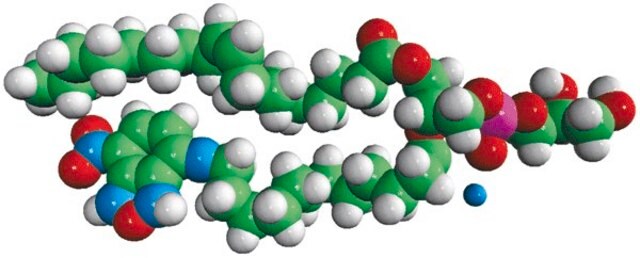810192P
Avanti
16:0-06:0 NBD PS
Avanti Research™ - A Croda Brand 810192P, powder
Sinônimo(s):
1-palmitoyl-2-{6-[(7-nitro-2-1,3-benzoxadiazol-4-yl)amino]hexanoyl}-sn-glycero-3-phosphoserine (ammonium salt)
Faça loginpara ver os preços organizacionais e de contrato
About This Item
Fórmula empírica (Notação de Hill):
C34H59N6O13P
Número CAS:
Peso molecular:
790.84
Código UNSPSC:
12352211
NACRES:
NA.25
Produtos recomendados
Ensaio
>99% (TLC)
forma
powder
embalagem
pkg of 1 × 1 mg (810192P-1mg)
fabricante/nome comercial
Avanti Research™ - A Croda Brand 810192P
Condições de expedição
dry ice
temperatura de armazenamento
−20°C
Descrição geral
Phosphatidylserine (PS) is a membrane phospholipid enriched in the cytosolic leaflet of plasma membrane. It comprises 2-10% of total phospholipids. NBD PS is a flurosently labelled phospholipid with 7-nitrobenz-2-oxa-1,3-diazol-4-yl (NBD) at the headgroup of PS.
Aplicação
16:0-06:0 NBD PS has been used as a labelled translocase to detect ATP-dependent translocation across late Golgi membranes. It is also suitable for analysis of phospholipid scramblase 1 (PLSCR1) scrambling in proteoliposomes and to determine enzyme specificity of lipoteichoic acid synthase enzyme (LtaS).
16:0-06:0 NBD PS or 1-palmitoyl-2-{6-[(7-nitro-2-1,3-benzoxadiazol-4-yl)amino]hexanoyl}-sn-glycero-3-phosphoserine (ammonium salt) has been used in the 7-nitrobenz-2-oxa-1,3-diazol-4-yl (NBD) − phospholipase (PL) translocation assay to characterize an ATP-dependent flippase activity in yeast Golgi membranes. It may be used: to detect vesicular stomatitis virus G (VSV G) protein mediated cell-cell fusion, measure the enzyme substrate specificity of lipoteichoic acid (LTA) synthase (LtaS), in liposomes to determine the role of phospholipid scramblase 1 (PLSCR1) in phospholipid scrambling.
Ações bioquímicas/fisiológicas
Phosphatidylserine (PS) is involved in the regulation of many enzymes and structural components. It serves as an essential factor in the clearance of apoptotic cells. It is associated with cognitive disability in Alzheimer′s disease.
Embalagem
5 mL Amber Glass Screw Cap Vial (810192P-1mg)
Informações legais
Avanti Research is a trademark of Avanti Polar Lipids, LLC
Código de classe de armazenamento
11 - Combustible Solids
Certificados de análise (COA)
Busque Certificados de análise (COA) digitando o Número do Lote do produto. Os números de lote e remessa podem ser encontrados no rótulo de um produto após a palavra “Lot” ou “Batch”.
Já possui este produto?
Encontre a documentação dos produtos que você adquiriu recentemente na biblioteca de documentos.
An Unrecognized Function of Cholesterol: Regulating the Mechanism Controlling Membrane Phospholipid Asymmetry
Arashiki N, et al.
Biochemistry, 55(25), 3504-3504 (2016)
Measuring translocation of fluorescent lipid derivatives across yeast Golgi membranes
Natarajan P, et al.
Methods, 39(2), 163-168 (2006)
Osmotic stress adaptation in Lactobacillus casei BL23 leads tostructural changes in the cell wall polymer lipoteichoic acid
Palomino MM, et al.
Microbiology, 159(11), 2416-2426 (2013)
Mirka E Wörmann et al.
Molecular microbiology, 79(3), 566-583 (2011-01-25)
Lipoteichoic acid (LTA) is an important cell wall polymer in Gram-positive bacteria. The enzyme responsible for polyglycerolphosphate LTA synthesis is LtaS, first described in Staphylococcus aureus. Four LtaS orthologues, LtaS(BS) , YfnI, YqgS and YvgJ, are present in Bacillus subtilis.
Maria Karatsa-Dodgson et al.
Journal of bacteriology, 192(20), 5341-5349 (2010-08-17)
Lipoteichoic acid (LTA) is an important cell wall component of Gram-positive bacteria. The key enzyme responsible for polyglycerolphosphate lipoteichoic acid synthesis in the Gram-positive pathogen Staphylococcus aureus is the membrane-embedded lipoteichoic acid synthase enzyme, LtaS. It is presumed that LtaS
Nossa equipe de cientistas tem experiência em todas as áreas de pesquisa, incluindo Life Sciences, ciência de materiais, síntese química, cromatografia, química analítica e muitas outras.
Entre em contato com a assistência técnica